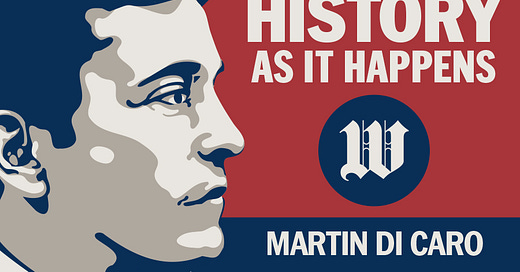My review of historian Carolyn Eisenberg’s Fire and Rain: Nixon, Kissinger, and the Wars in Southeast Asia was published in The Washington Times on Sept. 5, 2024. The review is copied below for your convenience. Fire and Rain won a 2024 Bancroft Prize for historical scholarship. The fiftieth anniversary of Nixon’s resignation inspired me to read and review it.
In August I interviewed the author about her book, the importance of antiwar activism today, and the dangers of the “imperial presidency.” You can listen to the podcast here.
“Fire and Rain: Nixon, Kissinger, and the Wars in Southeast Asia”
By Carolyn Woods Eisenberg
Reviewed by Martin Di Caro:
Who remembers Pham-thi-Toi? She survived the My Lai massacre in 1968. Six of her relatives did not. She was compelled to move to a refugee camp despite the danger of landmines. One blew off her limbs. Nearly a year later, after being fitted with prostheses in an American Quaker-run rehab center for maimed Vietnamese civilians, Pham-thi-Toi returned and opened a small shop. In April 1972, South Vietnamese soldiers fired into the camp. Bullets tore into Pham-thi-Toi’s stomach. Having cheated death twice, this young woman was now among the millions of Southeast Asians killed in one of the most brutal wars of the twentieth century.
One may not expect to read such stories in a diplomatic history, but the human face of war stares at you throughout Fire and Rain, Carolyn Eisenberg’s 2024 Bancroft Prize-winning study of the lies, deceptions, and earth-shattering violence that propelled President Richard Nixon’s prosecution of the wars in Vietnam, Laos, and Cambodia. The connection is critical because battlefield realities influenced decision-makers, who then tried to shape reality to their liking.
Ms. Eisenberg is a noted historian and critic of U.S. foreign policy who, all those decades ago, was a campus antiwar activist. Her moral compass continues to inform her scholarship. Brimming with insights from thousands of declassified documents and telephone transcripts, this book is a damning rendering of not only Nixon and his national security adviser Henry Kissinger but the national security state that made possible their policy of prolonging a lost war. The deaths of countless Southeast Asians may have mattered little to a White House bent on deceiving the public. To Ms. Eisenberg, however, it would be impossible to convey the sheer criminality of their actions without reference to the discomfiting consequences.
Published to coincide with the fiftieth anniversary of the Paris Peace Accords, Fire and Rain also evokes Nixon’s resignation a half-century ago for the crimes of Watergate. The author links Watergate and Vietnam because “the creation of ‘the plumbers’ had largely been inspired by the desire to suppress antiwar criticism. Yet apart from the particulars, there was something deeper at work because the secretiveness and lies, which had been a feature of previous administrations, had assumed epic proportions… the ordinary processes of national security decision-making had been torn loose from any institutional moorings,” Ms. Eisenberg writes.
Nixon and Kissinger concealed from Congress the bombing of Cambodia for 14 months from March 1969. Then they hid the planning for the invasion of Cambodia from the secretaries of state and defense. While insisting that the U.S. could not betray an ally in Saigon, Kissinger later promised Chinese premier Zhou Enlai that after the war the administration would begin withdrawing U.S. forces from Taiwan – a supposed ally – without having run this idea past Congress, the Taiwanese, or anyone else who might object to such a betrayal.
To secure “peace with honor,” the emotionally volatile Nixon and Kissinger repeatedly sought military escalation even as U.S. troop withdrawals accelerated. Their weapon of choice became the B-52 bomber, deployed with no regard for civilians. “Let’s brutalize them,” said Kissinger of the Linebacker II raids in late 1972 when “peace” was in the offing. The year prior, Nixon instructed his right-hand man to inform Hanoi he would “finish off the goddamn place… Just knock the [expletive] out of them.”
The president and national security advisor portrayed in these pages are storms of contradictions. Angry and autocratic in private, Nixon remained a master political manipulator in public. His televised addresses about Vietnam and detente with China and Russia convinced most Americans he was a peacemaker. The 1972 election results confirmed it; Democrat George McGovern, a staunch opponent of the war, carried one state. And Kissinger, who endlessly emphasized the importance of U.S. “credibility” in the Cold War, pleaded with Soviet and Chinese Communists to pressure the North Vietnamese to make concessions in the secret peace talks.
“Even without declassified transcripts, the contradiction existed in plain sight: if Nixon and Kissinger were exchanging toasts with communist leaders in Moscow and Beijing, why did the killing in Southeast Asia continue?” Ms. Eisenberg asks. Because they were desperate to secure a face-saving deal to extract the country from Vietnam.
Richard Nixon and Henry Kissinger got away with it. The governments they claimed to have supported in South Vietnam, Cambodia, and Laos did not survive. In the summer of 1974, the House impeachers voted against Article IV charging the president for the secret bombing of Cambodia. Kissinger’s reputation as a statesman soared. He remained unrepentant until his death at 100. In this sobering account, Carolyn Eisenberg reminds us of their calamitous failures.
“At the time, it was widely recognized that the Nixon administration’s policy in Southeast Asia had been disastrous. Lamentably, the self-serving belief that the freedom and security of people around the world depended on U.S. military might, somehow survived,” she concludes.



